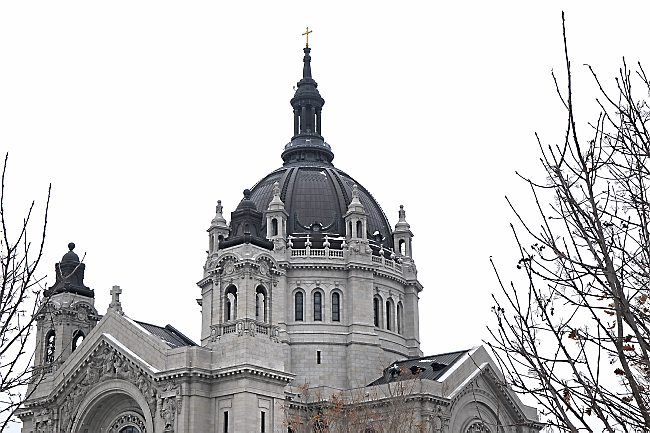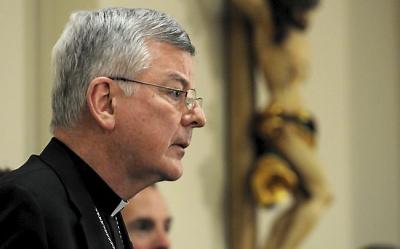Archdiocese Files for Bankruptcy, Putting Sex Abuse Suits on Hold
By Elizabeth Mohr
The Roman Catholic Archdiocese of St. Paul and Minneapolis filed for Chapter 11 bankruptcy protection Friday in federal court, calling it the best option to address all claims of sexual abuse at once, "fairly and with finality." The move was no surprise. Archdiocese officials had said they were considering bankruptcy in the wake of news of a $9.1 million operating deficit for fiscal year 2014 and expectations of more lawsuits over alleged clergy sexual abuse -- more than two dozen have already been filed. Bankruptcy protection will put current lawsuits against the archdiocese on hold, including three clergy sex-abuse trials scheduled to start this month. However, new claims can be filed while the bankruptcy case is active. Some victims' advocates accused church officials of using the bankruptcy as a maneuver to avoid trial, where depositions, documents and testimony might reveal details about abuse and its coverup. "In past bankruptcies we were involved in ... they did use reorganization to avoid trial and having to give testimony," said lawyer Jeff Anderson of St. Paul. "This time it's different." Anderson, a longstanding advocate for victims and an adversary of the archdiocese, said church officials have recently worked with him, because "they really want what we want. They want to protect children." Anderson represents 128 victims who have filed notices of claim or lawsuits with the archdiocese, and he has represented victims in other regions where a religious organization filed for bankruptcy. Archbishop John Nienstedt authorized the bankruptcy filing -- with permission from the Holy See -- after consulting outside experts, ranging from finance to law enforcement, who told him Chapter 11 reorganization was the best option, he said. The archdiocese said it was "unable to find a solution that was as fair as reorganization," which "resolves all claims collectively and fairly allocates resources." "This action will not in any way avoid our responsibility to those who have been affected by clergy sexual abuse," Nienstedt said at a press conference Friday. "This is not an attempt to silence victims. Nor is it an attempt to deny them their justice in court. On the contrary, we want to respond positively in compensating them for their suffering." Anderson said he has been involved in eight of the 14 bankruptcy protection filings by Catholic organizations or groups since 2004. "We will do this in a way that it's never been done before," Anderson said at a news conference at his office.
"In a way that can bring healing, it can bring compensation, it can advance change and not fight and get involved in contention and adversary relationships." Past bankruptcies have varied widely, Anderson said. The average resolution takes about two years. However, the bankruptcy case of the Archdiocese of Milwaukee, for example, remains unresolved after four years. Anderson said the archdiocese there has contested all victims' claims and has haggled over how much will be paid to claimants. Compensation for victims has varied, too. In a case involving the Diocese of Helena, Mont., Anderson said, each victim received about $42,000. However, in San Diego, victims were awarded almost $1.4 million each. It's unclear how much money will be made available to the more than 100 claimants in the Twin Cities. That could hinge on whether the archdiocese contests validity of claims and on availability of insurance coverage, which is in dispute. Anderson said for most victims, it's not about the money. "It's really about making sure that other kids are not hurt, making sure they've done something to prevent it from happening in the future and holding those responsible accountable in some way," Anderson said. "The filing of this bankruptcy ... doesn't keep us and the survivors with whom we're working from pursuing that objective." In November, the archdiocese said its operating deficit can be partly attributed to the $4.1 million it has spent to address claims of clergy sexual abuse since May 2013, when the Legislature opened a three-year window for victims to file claims over abuse that occurred many years ago. Since the law took effect, 25 lawsuits have been filed; two have been settled. Three suits were scheduled to go to trial Jan. 26. Those proceedings are now stayed, and their claims, along with any new claims, will be incorporated into the bankruptcy case. Archdiocese officials said in November that because of the "significant number" of claims they had been told would be filed, the church could no longer draw from budget reserves. Total operating revenue for the year ending June 30, 2014, was $25.5 million, compared with $32.7 million in 2013. That decrease was largely due to a $7.7 million drop when the Catholic Services Appeal was shifted into a separate nonprofit organization at the start of 2014. The move assured donors that their contributions would go directly to specified ministries, instead of flowing through the chancery. The archdiocese's chief financial officer, Thomas Mertens, wrote in the Nov. 20 issue of the Catholic Spirit, the official newspaper of the archdiocese, how a reorganization would affect operations: -- There's an expectation that the court would allow the Chancery Corp. to function as usual. -- Parishes and Catholic schools are independently incorporated and would not be part of the reorganization. -- It's premature to say how the bankruptcy would affect pensions and employee benefits, though a request would likely be made to maintain the plans, something that's been granted in other diocesan reorganizations. Less than a week after releasing its financial information, the archdiocese filed a federal lawsuit against some 20 insurance companies in an attempt to force them to cover its liabilities for clergy sex abuse claims. Anderson said that, based on what he's seen in other archdiocese bankruptcies, he's confident there will be enough money from those policies to fairly compensate victims. Filing for bankruptcy doesn't mean the church is broke, said the Rev. Tom Doyle, a Virginia-based canon lawyer who has testified on behalf of victims in civil cases. "They have filed for bankruptcy protection, not for insolvency," said Doyle, who serves as an expert or consultant on church structure and finances. "It's a tactic that's being used -- hopefully for the benefit of the victims." Doyle said other dioceses have tried to downplay their assets in bankruptcy cases, but the court can compel them to disclose everything on their books. A Chapter 11 bankruptcy lets the entity -- in this case the archdiocese -- continue to operate while reorganizing finances and addressing creditors' claims. First steps in the proceedings include appointment of a trustee and a committee of creditors. A bankruptcy judge will set a time frame for claims to be filed. It's unclear what that time frame will look like, but Anderson said he hopes the judge will align it with the state's window, which expires in May 2016. Meanwhile, Patrick Noaker, another victims' attorney, said he's disappointed by the bankruptcy filing. Noaker, who is handling a lawsuit stayed from trial this month, said the filing robs him of the chance to reveal information that could help protect children. "The process of bankruptcy is not going to make kids safer," he said. "I don't think it's any accident that they filed a week before this trial was going to start." The Survivors Network of those Abused by Priests (SNAP) on Friday said the archdiocese's bankruptcy filing was "a smart but selfish legal maneuver that will effectively prevent Catholics from getting key information and victims from getting real justice." "Nienstedt will say it's about helping to make sure everyone gets paid," SNAP's outreach director, Barbara Dorris said, in a statement. "But it's really about making sure he and his colleagues get off the hook, avoiding having to answer tough questions in open court about how they are concealing and have concealed heinous crimes against kids." Doyle said he's also skeptical of the church's motivation. "The church will never divvy out settlements in an equitable way -- voluntarily. They have to be forced. They've never done it in the history of the church," Doyle said. "When they say they're trying to protect them, it's really self-serving and dishonest. That's really up to the victims to decide. They should say I want to go to court or not." Nienstedt contended some victims may not want to go through the court process and that the bankruptcy will offer them compensation without further pain. "I think there are different forums in which victims can tell their stories, and I think we have to find ways of doing that," the archbishop said. This report includes information from the Associated Press. Elizabeth Mohr can be reached at 651-228-5162. Follow her at twitter.com/LizMohr.
|
.
Any original material on these pages is copyright © BishopAccountability.org 2004. Reproduce freely with attribution.

